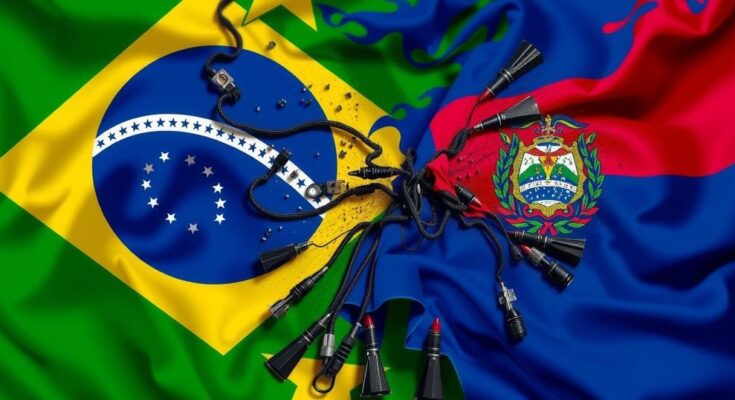Brazilian government expresses surprise at Venezuela’s escalating rhetoric and personal attacks towards its officials, emphasizing that such actions undermine diplomatic relations. The tensions have been inflamed by disputes over Venezuela’s electoral transparency and Brazil’s refusal to support its bid to join BRICS. Brazil affirms its commitment to respect sovereignty while advocating for dialogue and transparency moving forward.
On Friday, Brazil’s government publicly addressed the increasing tensions with Venezuela, expressing surprise at the aggressive tone adopted by Venezuelan authorities towards Brazil. The Brazilian Foreign Ministry specifically criticized the Venezuelan government for resorting to personal attacks and rhetorical escalations rather than engaging in political dialogue. The statement emphasized that such behavior is inconsistent with Brazil’s approach towards maintaining respectful relations. Recently, Venezuela’s government intensified its criticism following comments from a Brazilian official who noted Brazil’s lack of support for Venezuela’s membership in the BRICS bloc during a summit in Russia. This situation further strained relations amidst ongoing disputes regarding the results of Venezuela’s July presidential elections and demands for greater transparency from Brazil and other countries. Venezuela’s Foreign Ministry summoned Brazil’s chargé d’affaires to convey their strongest objections to what they termed “interventionist” remarks from Brazilian representatives. They specifically accused Brazil’s former foreign minister of siding with American imperatives in assessing Venezuelan affairs. Brazil, which initially opted for a restrained diplomatic stance, decided to respond after Venezuela’s police shared an incendiary image that implied threats towards Brazil. In their official statement, Brazil reiterated its commitment to non-intervention and respect for sovereignty, specifying that its interest in Venezuela’s electoral process stems from its role as a witness to the 2023 Barbados Agreements. The statement concluded by affirming Brazil’s belief in constructive partnerships built on dialogue and mutual respect. Former Foreign Minister Celso Amorim acknowledged the tension and associated it with the Maduro administration’s lack of transparency concerning election results. He maintained that the improvement of diplomatic relations relies heavily on actions taken by Venezuela. In contrast, Venezuelan electoral officials claimed that their inability to publish detailed electoral results was due to hacking incidents, whilst opposition groups declared a landslide victory against Maduro. The BRICS bloc, which includes several influential nations, faced Brazil’s opposition when it came to including Venezuela, as Brazil views its members should possess significant influence in regional representation. Venezuela’s Foreign Affairs Ministry criticized Brazil’s stance as irrational and likened it to unilateral economic sanctions imposed by the United States.
The recent tensions between Brazil and Venezuela have been underscored by a series of personal attacks launched by the Venezuelan government against Brazilian officials, including President Luiz Inácio Lula da Silva. These attacks emerged after Brazil’s refusal to back Venezuela’s application to join the BRICS group and stemmed from dissatisfaction with the handling of post-election processes following Venezuela’s presidential elections in July. Brazil’s diplomatic posture has traditionally favored non-involvement and respect for national sovereignty, yet the Venezuelan government’s escalating rhetoric necessitated a response, challenging Brazil’s diplomatic beliefs and bilateral relations.
In conclusion, Brazil’s Foreign Ministry has firmly addressed the rising tensions with Venezuela, reacting to personal attacks from its neighbor and reaffirming its commitment to peaceful diplomatic relations. The historical context of these tensions—as tied to Venezuela’s electoral integrity and Brazil’s stance on international partnerships—illustrates a complicated dynamic that calls for renewed dialogue and constructive engagement between these two South American nations.
Original Source: abcnews.go.com




